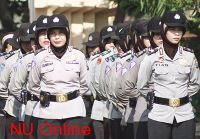Sidoarjo, NU Online
Several policewomen in Sidoarjo and Surabaya, East Java, donned the Islamic head scarf or hijab on Friday following the National Police’s decision to lift a ban on wearing the attire. <>
“This is the National Police chief’s decision. Policewomen are now allowed to wear head scarves,” Surabaya Police chief Sr. Comr. Setija Junianta said as quoted by tribunnews.com. He said that of 146 policewomen stationed in Surabaya, 40 of them had officially requested to be allowed to wear the hijab.
National Police chief Gen. Sutarman gave his approval on Wednesday, allowing policewomen to wear the Islamic head covering to work.
“Wearing a hijab is part of religious freedom. Policewomen who want to cover their heads can do so, just like the policewomen in Aceh. They must, of course, buy their own hijab as we don’t have the budget to supply them,” he said at National Police headquarters in South Jakarta recently.
The ban on policewomen wearing hijab was introduced in 2005, when then-National Police chief Gen. Sutanto issued a decree ordering all police officers to wear only official police force attire.
The decree stipulated that if the instruction was violated, it could result in dismissal.
Female police officers in Aceh were excluded from the regulation, given the province’s 2001 sharia bylaws, which oblige all women to cover their hair.
In June this year, Muslim groups, politicians and rights campaigners called on former National Police chief Gen. Timur Pradopo to lift the decree, arguing that it infringed on the basic rights and freedom of Muslim women on the force.
Bowing to public pressure, Timur set up a team to discuss the revocation of the decree. The instruction was not annulled, however, until Timur was succeeded by Sutarman in October.
Pressure also came from within Polwan Indonesia, a Facebook group with over 800 members, which became a site where policewomen could share information and amass support for the revocation of the hijab ban.
Police chiefs in Malang, Blitar and Jombang in East Java recognized the death of the decree by allowing their female colleagues to wear hijab on Fridays.
Sutarman said he had thus far only verbally lifted the ban and had no plan to legalize the new rule in a decree. “Issuing a decree means that the force would have to provide the garments. We cannot afford that,” he said. While allowing the wearing of the hijab, Sutarman reminded policewomen to be professional in their choice of accoutrement.
“The hijab’s color must matched that of your uniforms. Don’t choose hijab that clash,” he said as quoted by The Jakarta Post.
In consideration of the Islamic obligation that Muslim women should cover their bodies from head to toe, Sutarman also said policewomen were free to choose to wear long pants rather than their knee-length skirts, if they preferred.
Soon after the announcement, Polwan Indonesia’s Facebook page was inundated with positive comments and thanks by a number of policewomen. “Congratulations to Bapak National Police chief. I pray that he will always be under Allah’s protection during his time in office,” one Medan police officer, Menie Lubis, wrote.
Tati Suharyo, a senior officer with the Jakarta Police, even contacted a national Muslim clothing store to have special hijab made to match their brown uniforms.
“Good evening all, [I] have ordered hijab from Rabbani. When the store is ready, we can all start ordering and purchasing [our hijab] at Rabbani stores across the country,” Tati wrote.
The National Police currently have 20,000 policewomen, representing only 5 percent of the force’s 400,000 personnel.
Editing by Sudarto Murtaufiq
Terkait
Terpopuler
1
Panduan Shalat Gerhana Bulan Petang Ini, Mulai Niat hingga Salam
2
PBNU Instruksikan Qunut Nazilah Respons Agresi Israel-AS ke Iran
3
Jadwal Cuti Bersama dan WFA Lebaran 2026, Total Libur Capai 16 Hari
4
Ketua Umum PBNU Mengutuk Serangan AS-Israel atas Iran
5
Khutbah Gerhana Bulan: Tanda Kekuasaan Allah dan Kesempatan Beramal Saleh
6
Amalan-amalan yang Dianjurkan ketika Terjadi Gerhana Bulan
Terkini
Lihat Semua



